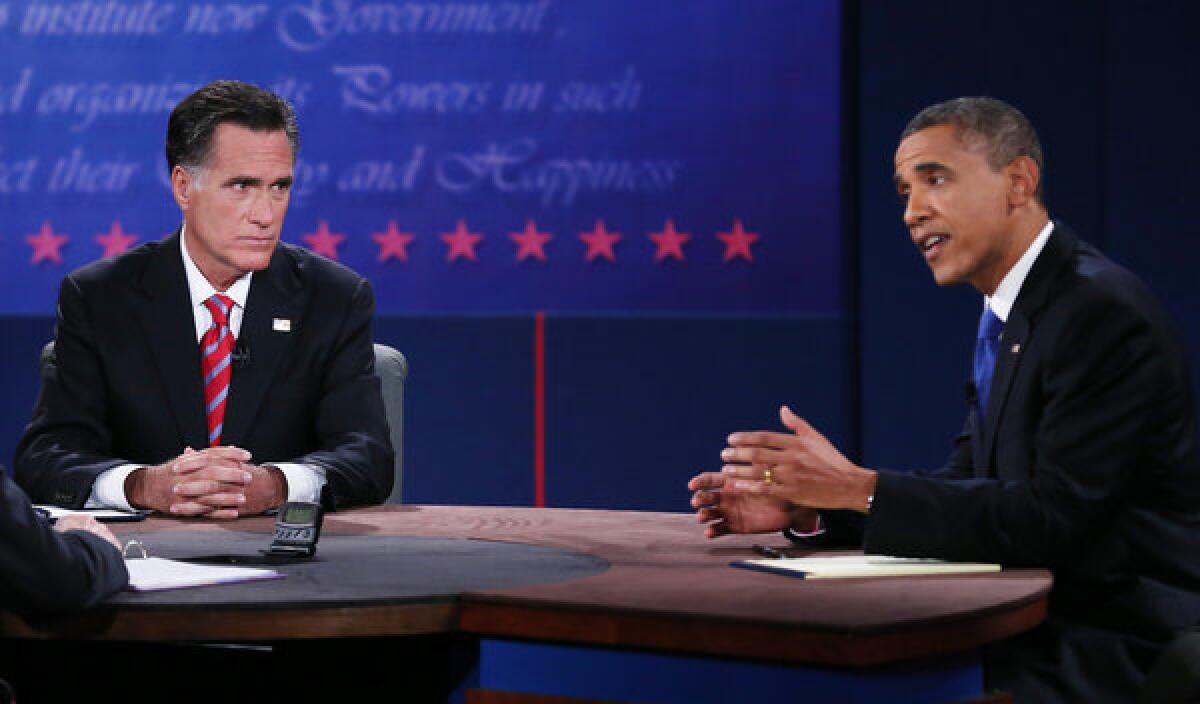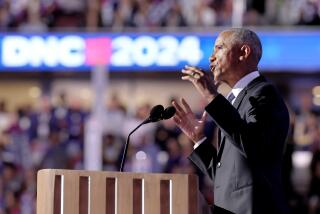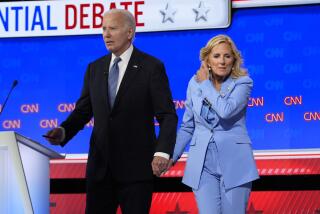McManus: A kinder, gentler Romney

It’s a safe bet that President Obama misses the old Mitt Romney — the one who described himself as “severely conservative.”
In their first debate in Denver, Romney outflanked the president by assuming the role of Moderate Mitt, a sweet-tempered fellow we hadn’t met before. He promised he’d never reduce the share of the tax burden paid by wealthy Americans, cut federal education spending or restrict access to contraceptives. Obama seemed flummoxed that the opponent he’d expected was a no-show.
On Monday evening, Romney tried the same approach, this time on foreign policy. The Republican who’d spent most of a year promising to get much tougher on Iran and China was suddenly the soul of sweet reason. “We want a peaceful planet,” he said. He politely congratulated Obama for arranging the demise of Osama bin Laden; he agreed blandly with Obama that American troops should be home from Afghanistan by 2014. On foreign policy, Moderate Mitt gave way to Mitt the Mild.
ENDORSEMENTS: The Times’ recommendations for Nov. 6
If the aim was to assure America’s few remaining undecided voters that they have nothing to fear from a Romney presidency, the GOP campaign could break out a banner reading “Mission Accomplished.” Except that would look too warlike.
Romney’s relentless agreeability left Obama to debate not the Romney he was facing, but the Romney of the Republican primary campaign. “Your strategy … has been all over the map,” Obama protested, pointing out that Romney once wanted to keep troops longer in both Iraq and Afghanistan.
But the GOP candidate shook his head and looked sorrowful. “Attacking me is not an agenda,” he scolded — mildly.
PHOTOS: Six numbers to ignore from the presidential campaign
He even criticized Obama from the left, arguing that the incumbent hasn’t put enough energy into foreign aid programs in Pakistan and other Muslim countries to undercut the growth of Islamic extremism.
“We can’t kill our way out of this mess,” Romney said, sounding eerily like one of Obama’s liberal critics.
It wasn’t a genuine outbreak of bipartisan agreement; the two candidates made it clear — in tone more than substance — that neither thinks much of the other.
COMMENTARY AND ANALYSIS: Obama vs. Romney
And, to be sure, there were still disagreements. Romney charged that Obama had presided over a steady loss of U.S. influence in the world; Obama said that simply wasn’t so.
But voters who tuned in searching for clear distinctions between the two parties’ foreign policies listened mostly in vain.
And that’s because the two candidates had different goals. Romney appeared intent primarily on avoiding mistakes. In unguarded moments, the GOP candidate has stumbled into foreign policy gaffes, pronouncing Russia the nation’s No. 1 foe and questioning London’s readiness for the Summer Olympics. Only last week, he wrongly accusing Obama of failing to mention terrorism after the attack on the U.S. consulate in Benghazi.
On Monday, Romney seemed determined to have no unguarded moments. The Republican candidate at the debate was as well-prepared and cautious as any politician in history. He was content to play for a tie.
Obama, on the other hand, looked and sounded like an underdog. The president, who has enjoyed an advantage in the polls on foreign policy all year, was intent on pressing his edge — on making sure voters remembered who it was who killed Osama bin Laden and brought the troops home from Iraq. His message was that he knew how to run foreign policy, and Romney didn’t. But with the Republican blandly agreeing with him much of the time, it was hard to land a punch.
On Afghanistan, the Romney who once criticized Obama for setting a timetable for withdrawal said the calendar seemed fine.
When Obama noted that Romney had called for deeper U.S. involvement in the civil war in Syria, Romney protested. “We don’t want to get drawn into a military conflict,” he said.
And on Iran, where Romney has criticized Obama’s diplomacy for failing to achieve quick results, the Republican insisted that he wasn’t calling for war.
“A military action is the last resort,” he said. He praised Obama’s economic sanctions on Iran as “the right thing to do.”
On only one issue did the candidates clash directly: defense spending. Obama has called for modest cuts in the Pentagon budget over the coming decade; Romney has proposed a major funding increase.
“We spend more on our military than the next 10 countries combined,” Obama complained. “The math [of Romney’s proposal] just doesn’t work.”
Romney defended his arithmetic, but the confrontation allowed both candidates to pivot to the ground on which this election is really being fought: domestic economic policy.
“It’s time to do some nation building right here at home,” Obama said, citing education, energy and scientific research.
“I know what it takes to create 12 million new jobs,” Romney said.
Their body language suggested that this was the real battle; foreign policy was just a sideshow.
But we, and they, knew that all along.
Follow Doyle McManus on Twitter @DoyleMcManus
More to Read
A cure for the common opinion
Get thought-provoking perspectives with our weekly newsletter.
You may occasionally receive promotional content from the Los Angeles Times.









